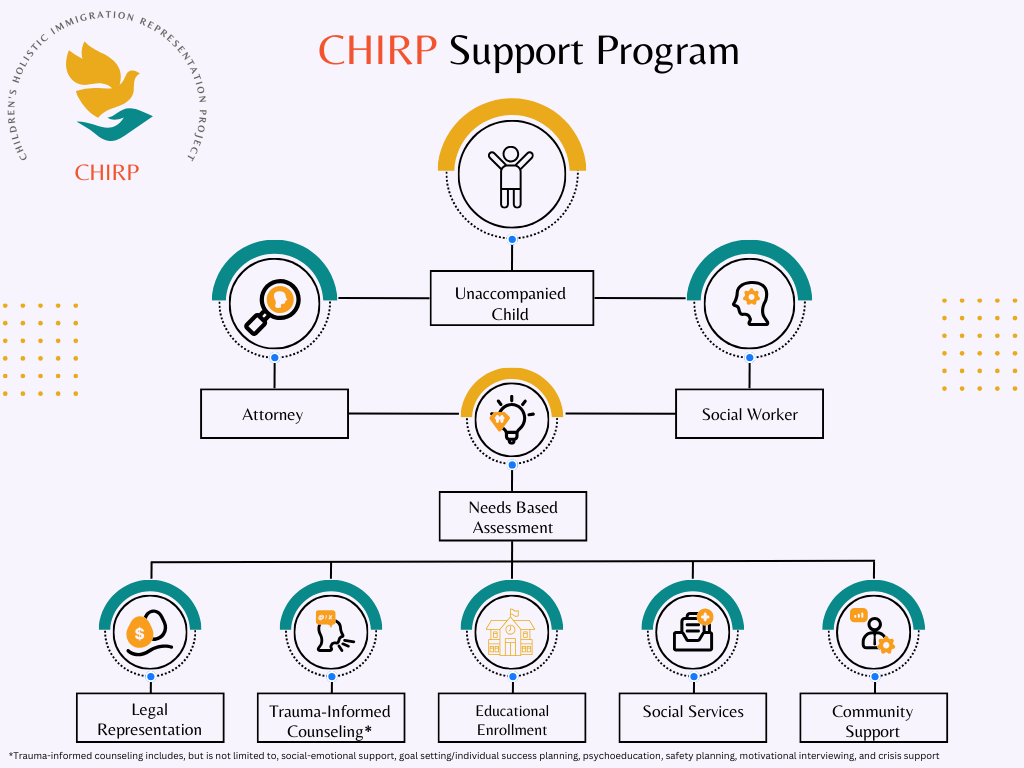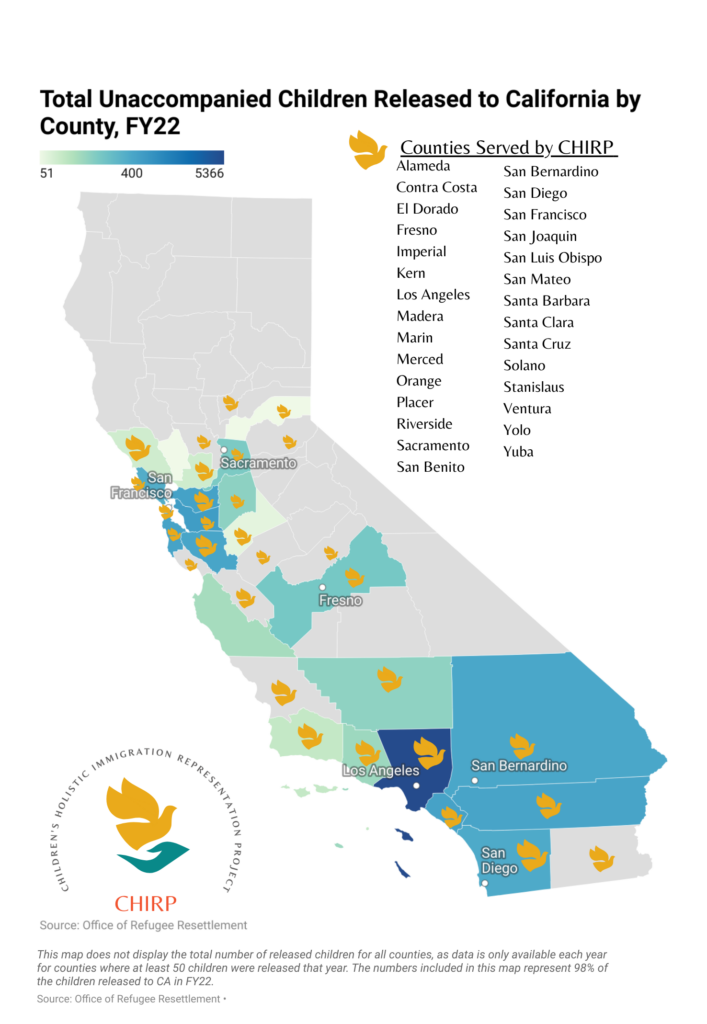 Summary
Summary
Unaccompanied immigrant children require universal and holistic legal representation to ensure they obtain the legal counsel and trauma-informed services needed to thrive in their new home. The Children’s Holistic Immigration Representation Project (CHIRP) is a two-year pilot project funded by the California Department of Social Services (CDSS), which provides integrated social and legal services to unaccompanied minors across California. Since its inception in September 2022, the program has provided legal representation to hundreds of children and case management support in education, mental health, medical, food access, and housing assistance. Advocates are seeking funding in the 2025-26 budget in the amount of $33 million dollars to maintain the program and ensure a continuum of services through SFY2028.
Background
Every year, more than 10,000 unaccompanied immigrant children are placed with sponsors in our state, seeking protection and support. Unaccompanied immigrant children taken into federal custody at the border are referred to the Office of Refugee Resettlement (ORR) before being released to family members or trusted caregivers. Out of the 99,381 unaccompanied children released from ORR custody during FY24, 11 percent (10,819) were released to sponsors throughout the state of California. The four counties that received the highest number of children released from ORR in FY24 are Los Angeles, Alameda, Contra Costa, and Orange. Most youth settle in cities, but from FY21 to FY22, there was a 49 percent increase in the number of children released to the counties comprising Central Valley North: Placer, Sacramento, San Joaquin, Solano, and Stanislaus.
Unaccompanied children often experience layers of significant hardships that can begin with exposure to trauma in early childhood and extend to challenges experienced while transitioning into California communities, such as securing housing, accessible education services, and medical and mental health treatment, all while navigating the immigration system. Challenging experiences during this period, such as mental distress and behavioral difficulties, school interruption, and housing instability, can affect a child’s ability to heal trauma, reunite with their families, and integrate successfully into California communities. Adverse childhood experiences during critical periods of development can result in lifelong impacts and challenges for youth, making programs like CHIRP an important investment in the future of this population.
Problem
The current policies and procedures in place for unaccompanied minors arriving in the United States are fractured and complex, involving state and federal authorities and various levels of bureaucracy, with no single source of responsibility for the welfare of immigrant children.
Obtaining legal representation is only the first step in assisting these children, who need additional services to ensure they are properly cared for. A child’s legal case is usually secondary to other challenges, such as trauma, unemployment, health conditions, and houselessness. Without an essential bridge between legal and social services, children may be left with untreated mental health challenges or lack the necessary guidance and support that are needed to access critical services.
Trafficking risks are the highest for children and youth with compounding traumas, housing instability, and experiences in out-of-home placements that further isolate them from their relatives and communities. In particular, unaccompanied minors face a significantly increased risk of being trafficked for labor exploitation or criminal exploitation. Unaccompanied children must be provided with proper care, and community support, to protect against these abuses and allow for integration, adjustment and long-term development.
Solution
CHIRP provides holistic legal advocacy for unaccompanied children, with an emphasis on trauma-informed intervention to ensure that unaccompanied minors have both legal services and appropriate care. The goal of this model is not only to achieve the best possible outcome for the legal case, but to advocate for the client in other areas and connect them to supports that can help improve their overall well-being and promote healthy youth development.
Each youth is assigned a fully integrated team that includes an attorney and a social services staff member (either a social worker or a case manager) to accompany them throughout the case. The focus is assessing, understanding, and addressing the client’s intersecting needs and ensuring their emotional and physical safety and stability. The program seeks to heal the wounds caused both by the experiences in their countries of origin that led them to migrate to the United States, as well as the trauma of the U.S. immigration legal system.
The holistic legal representation provided by CHIRP ensures that no child is left to defend themselves alone in immigration proceedings but rather has an interdisciplinary team of zealous advocates to identify and respond to external challenges that often influence their legal case and which might otherwise be unaddressed.
CHIRP is a first-of-its-kind program that benefits the well-being of recently arrived children in California and can serve as a model for other states on how to welcome and support the arrival of unaccompanied immigrant children into their communities responsibly.

CHIRP Impact
“He suffered extreme domestic violence in his country and fled to the U.S. He does not speak English or Spanish, and was not able to access any support because of the language barrier and trauma… [The] attorney immediately connected him to our trained caseworker to assess his needs. Within a matter of weeks, our caseworker helped him to enroll in high school, apply for Medi-Cal, connect him to local food banks, and get into a youth-focused wellness clinic. After starting his school and getting resources that he needed, he started to feel more comfortable and finally opened up to our attorney about several incidents of violence, which made him a strong candidate for asylum. While talking to his brother who is [his] sponsor, we realized that he could qualify for SIJS. We accepted his case on an emergency basis and now both brothers are going to be able to adjust their status and continue living as a family here in the U.S.”- CHIRP Attorney.
Program Highlights
(September 1, 2022 – December 31, 2023)
- 16 organizations across the state are providing holistic services through CHIRP, which were previously unavailable, particularly in under-resourced rural areas of California where there is a dearth of legal services and unaccompanied children are particularly vulnerable.
- CHIRP has expanded legal representation: Over 600 children have been provided with legal representation in their immigration cases
- CHIRP has expanded in-person support for the appointments that impact unaccompanied children’s lives. The program has also increased referrals to critical services:
- Social service professionals have provided in-person accompaniment in over 300 instances for educational, mental health, medical, youth development/mentoring, food access, housing, legal or other service appointments
- CHIRP staff have provided over 1100 referrals to these same critical services.

Host Organizations
- Bet Tzedek Legal Services
- Canal Alliance
- CARECEN-LA
- Catholic Charities East Bay
- Catholic Charities Los Angeles
- Catholic Charities San Francisco
- Centro Legal de la Raza
- Children’s Law Center of California
- Community Justice Alliance
- East Bay Community Law Center
- East Bay Sanctuary Covenant
- Immigration Center for Women and Children
- Immigrant Defenders Law Center
- KIND, Inc. (Kids In Need of Defense)
- Opening Doors
- Public Counsel